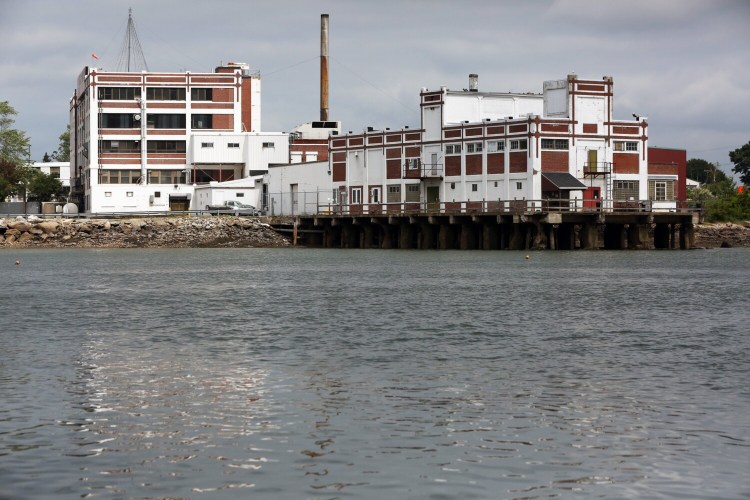The nonprofit that is developing the former B&M Baked Beans property in Portland is seeking a zoning change that would allow construction of what would be Maine’s tallest building as part of a group of large buildings on the former industrial site.
The Institute for Digital Engineering and Life Sciences, or IDEALS, is redeveloping the former bean factory to house the Roux Institute at Northeastern University, a technology graduate school and business accelerator.
Changes requested by the developer would allow it to construct buildings from 75 feet to 210 feet tall, including a 16- to 17-story residential high-rise, representatives from IDEALS said during a public meeting last week.
Currently, the 16-story Franklin Towers housing development in Portland is the state’s tallest building. However, Redfern Properties is constructing an 18-story apartment building downtown that will become the state’s tallest building at 190 feet, surpassing Franklin Towers by 15 feet when it is completed in 2023.
IDEALS also wants the area rezoned from industrial to business for its new campus, as well as a special designation called an institutional overlay reserved for medical and higher-education campuses. The zoning overlay is intended to guide major developments near residential neighborhoods.
The nonprofit is drafting a required institutional development plan for its project. That document would set out how the site is developed in a phased approach over the next 20 years.
CONCERN FROM NEIGHBORS
Some neighbors and others are concerned about the scale of the proposal and question whether the institutional designation is appropriate for a campus that would include a hotel and restaurants.
“The goal is really to accommodate as much housing on the site as we can, tax the existing Portland housing stock as little as we can and provide as much green space on the campus as we can,” Rick Kobus, the project’s lead designer, said at the Feb. 1 meeting. Developers have emphasized the creation of new waterfront public space at the factory site.
Proposed building heights were planned to fit with the landscape and neighborhood, IDEALS Executive Director Chuck Hewett said. The tallest residential building would be close to the highest point of Interstate 295 as it passes the site on the west. The lowest point would be near the waterfront.
“This is an urban design,” Hewett said. “It is going to have, if we are successful, the density that is essential to really create a technology hub. At the same time, we want the site to respect the neighborhood, respect the bean building, respect the water and showcase Maine’s future.”
But some neighbors are worried about the added traffic the development could attract and the scale of new buildings envisioned.
James Pratt, a homeowner on Kendall Street just north of the factory site, said his neighborhood is zoned for single-family homes where the structure height is limited to 35 feet.
“I am very concerned that a 175- to 200-foot tall building will overwhelm and shadow our neighborhood that abuts your site,” Pratt said at the Feb. 1 meeting. “I think there is a lot of exciting potential, but I am worried about the heights you are proposing.”
IDEALS says it intends to limit vehicle traffic to the property with public transit, car sharing, walking and cycling paths. Building on-site housing for students and staff is one way to reduce the amount of vehicles coming in and out.
The Roux Institute’s student population could grow from about 1,750 in the first five years to 4,500 in two decades, IDEALS estimates. “We anticipate building housing in phase one,” Chief Operations Officer Sam Reiche said in an interview Tuesday. “Whether that is a third or a half of it, it will be something in that range. We see housing as very critical in phase one.”
FOCUS ON HOUSING IN FIRST PHASE
IDEALs announced the purchase of the B&M factory in August. The developer plans to keep the existing factory building and add a number of other buildings that include classroom and lab space, business incubator space, a hotel, restaurants and apartments.
Some people have said commercial uses, such as restaurants, should not be covered by institutional zoning, but Reiche said it is important to the overall project.
“We see that having this mix of uses on the site is critical for it to actually work to incubate companies and attract international companies,” Reiche said. “We see them as institutional amenities that are definitely critical to our success.”
IDEALS plans to close on the purchase of the B&M property next month. It expects to file its zoning application within a month.
The Roux Institute was established in 2020 with a $100 million donation by Lewiston native and technology entrepreneur David Roux. It is meant to encourage cutting-edge technology development in Maine and educate and train a highly educated workforce for the state.
Send questions/comments to the editors.




Success. Please wait for the page to reload. If the page does not reload within 5 seconds, please refresh the page.
Enter your email and password to access comments.
Hi, to comment on stories you must . This profile is in addition to your subscription and website login.
Already have a commenting profile? .
Invalid username/password.
Please check your email to confirm and complete your registration.
Only subscribers are eligible to post comments. Please subscribe or login first for digital access. Here’s why.
Use the form below to reset your password. When you've submitted your account email, we will send an email with a reset code.